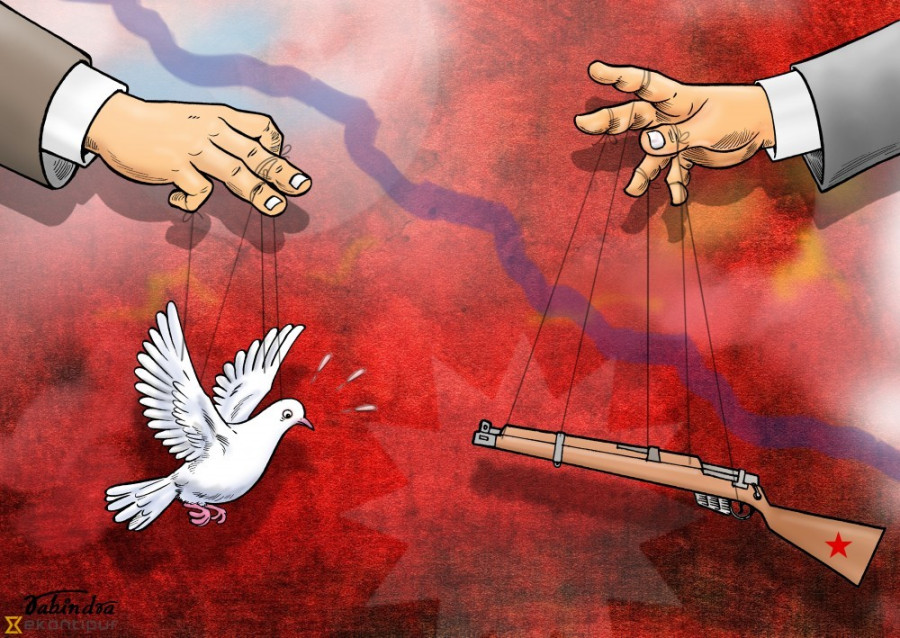Politics
Parties’ undue intervention could call credibility of transitional justice process into question
Conflict victims and rights activists say politicians must correct their past mistakes and appoint officials in an impartial and transparent manner.
Binod Ghimire
When officials were appointed in the two transitional justice bodies in February 2015, conflict victims and human rights activists had expressed their reservations, saying appointments were made under political parties’ quota.
There were also concerns that a majority of those who were appointed in the Truth and Reconciliation Commission and the Commission of Investigation on Enforced Disappeared Persons lacked experience.
The commissions were formed, almost a decade after the signing of the Comprehensive Peace Agreement, to investigate human rights violations committed during the decade-long “people’s war” and ensure justice to the victims.
The commissions, which were hamstrung by lack of resources and necessary laws, could not do much.
In the first week of February, the government amended Enforced Disappearances Enquiry, Truth and Reconciliation Commission Act-2014 and said chairpersons and members of the commissions would be relieved of their duties on April 14. Four months have passed since, but the government has yet to appoint officials in the transitional justice bodies. But now two major parties—the ruling Nepal Communist Party and primary opposition Nepali Congress—are in agreement to appoint officials on the basis of political sharing.
Human rights activists and conflict victims say the parties are on the verge of squandering an opportunity to correct their past mistakes, as they are still trying to appoint people of their choice in the two commissions.
“The international community is closely watching the ongoing development,” Kapil Shrestha, a former member of the National Human Rights Commission and a human rights defender, told the Post. “The credibility of the entire transitional justice process is at stake.”
The Nepal Communist Party and the Nepali Congress on Wednesday decided to pick former attorney general Raman Shrestha as the chief of the truth commission. However, Shrestha turned down the offer. The two parties are in a bid to find a person “suitable” to them to lead the disappearance commission.
The parties’ move also tramples upon the jurisdiction of a five-member recommendation committee formed under former chief justice Om Prakash Mishra in March. The committee, which has a commissioner from the National Human Rights Commission as a member, has been held hostage by the parties and is waiting for the parties to finalise their nominees.
Shrestha said the cost of ignoring the concerns of the conflict victims and the national and international human rights organisations could be high
“Parties must not forget the transitional justice has universal jurisdiction, and they cannot dilute it,” Shrestha told the Post.
Conflict victims say the representatives of the international human rights organisations have been inquiring about the recent move of the two major political parties and have assured that they would raise the issue in the international platform.
Janak Raut, general secretary of Conflict Victims Common Platform, told the Post that upon the inquiry, he had briefed to some of the international human rights organisations on the recent development. “I urge the major political parties to not be under the illusion that they can derail the transitional justice process, which is an issue of international concern,” said Raut.
Different human rights organisations, including the Office of the United Nations High Commissioner for Human Rights, have time and again asked the Nepal government and political parties to make the transitional justice process consultative and adhere to the international norms.
On April 17, five UN special rapporteurs had asked the government to maintain impartiality, independence and transparency in the selection of the chairpersons and members in the two commissions.
Similarly, on July 29 Amnesty International, International Commission of Jurists, Human Rights Watch, and TRIAL International asked Nepal to adopt a consultative and transparent appointment process, ensure the amendment is in line with international human rights standards and with the Supreme Court ruling, and come up with a plan to take the transitional justice process forward.
“The recent acts show the government and the political parties do not seem to have taken the concerns of the conflict victims and the international human rights organisation seriously,” Nirajan Thapaliya, director at Amnesty International Nepal told the Post. “They must maintain transparency and avoid politicisation to ensure transitional justice process is credible.”
Victims say they are losing patience as no concrete steps have been taken to provide justice even though it has been 13 years since the peace deal was signed.
They say the leadership in the two commissions must be selected impartially, and the works should be done to provide justice as soon as possible.
“We won’t accept the chairpersons and members appointed for the convenience of political parties,” Devi Sunar, mother of Maina Sunar who was abducted and killed by Nepal Army personnel in 2004. “If parties think they can tire us out, then they are wrong. Days aren’t far when victims will take to the streets, and that will cost them dearly.”
***
What do you think?
Dear reader, we’d like to hear from you. We regularly publish letters to the editor on contemporary issues or direct responses to something the Post has recently published. Please send your letters to [email protected] with "Letter to the Editor" in the subject line. Please include your name, location, and a contact address so one of our editors can reach out to you.




 11.12°C Kathmandu
11.12°C Kathmandu















